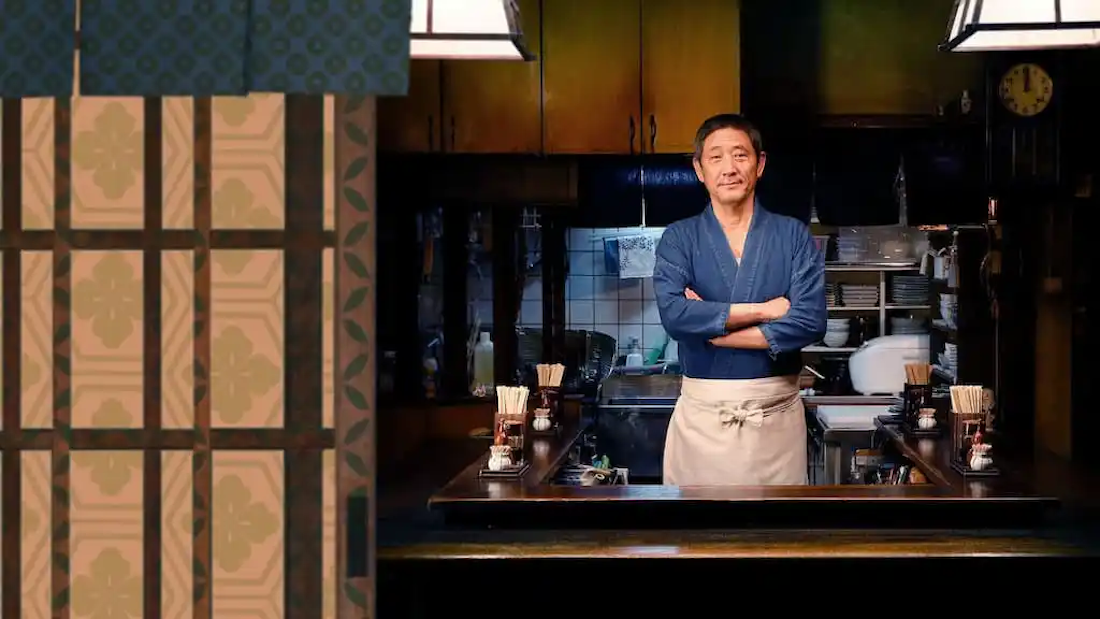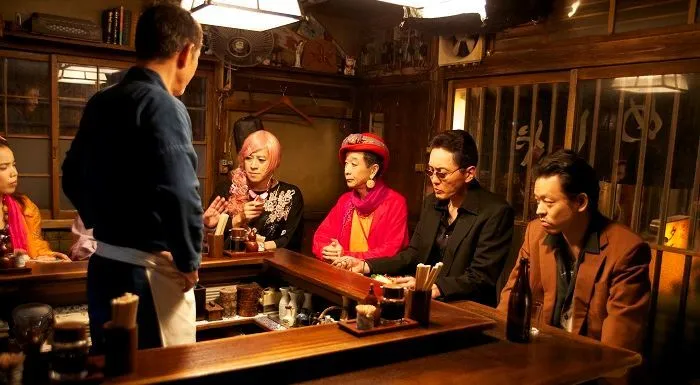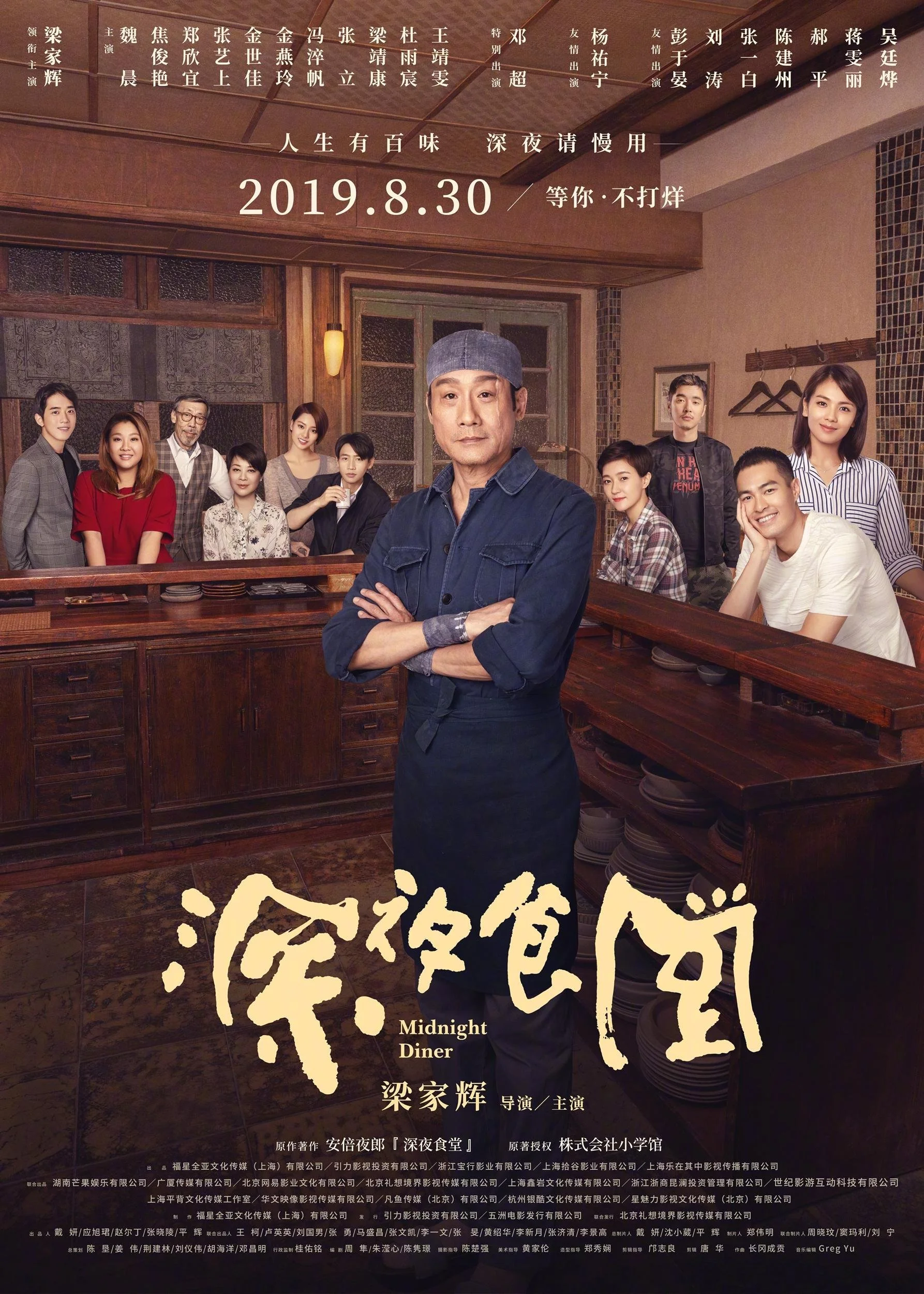Midnight Diner: Small Bites Of Humanity
In the midst of Tokyo there’s a cramped street peppered with neon signs advertising different clubs and bars. Walk down far enough and there’s an unassuming store front, a small diner that couldn’t seat more than 15 people comfortably. Open from midnight until dawn, a single man works and maintains the entire establishment. The menu that hangs unceremoniously on the wall boasts a single item, however Master (as he’s referred to by his customers) is more than willing to prepare whatever one desires, so long as he’s got the ingredients to do so.
Midnight Diner is a series based on the manga Shin’ya Shokudo by Yaro Abe. It’s an extremely faithful adaptation, even the opening is a dramatization of the manga’s first page. “Omoide” (Memories) by Tsunekichi Suzuki, a melancholic folk jam, plays over interluding clips of traffic and swaths of people headed in every which direction. Eventually, the sequence cuts to Master preparing to open up for the night, juxtaposing the hustle and bustle of the city with the older man’s relaxed and methodical routine. Every episode is a unique story that centers a specific dish and the people who order it. Like any other drama the topics vary to showcase interesting or reflective aspects about the human experience that prompt introspection. Midnight Diner does this without ever feeling hamfisted; something I can confidently credit to Abe. While reading a 2012 interview from Korea JooAng Daily, I was astounded by just how deliberate everything about the series is. Abe makes very tactful creative choices that are ultimately responsible for how personable and intimate the series feels to the audience. When asked by Joo-hyun Yoo, “Do you believe that food can strengthen relationships between people?” Abe flat out says “No, I have never thought that”, which… is incredible, right? This is a series where meals are often the catalyst of a plotline, and the guy behind it says, in no uncertain terms, that food is given too much philosophical weight in media. Abe goes on to elaborate that he finds it unrealistic to have food be this life changing force in his narratives, ending on the sentiment “I don’t want to write those fake stories.”
That right there is the basis of what makes Midnight Diner such a great series: the stories told can’t just be relatable, they have to be realistic as well. Realism, in this context, having nothing to do with congruity, but rather showcasing how chaotic everything is. The human experience is disorganized mundanity (no amount of routine or perceived normalcy can stop people from being the little freaks we are) and the characters of Midnight Diner represent this concept well. Most are single, middle-aged adults who vary wildly in personality and temperament. People around that age have all the benefits of having learned and grown from their youth while also being in the position of “still figuring things out.” Midnight Diner serves large helpings of reflection- emphasizing throughout the series that human beings are constantly changing for, in spite of, and thanks to one another. The show perpetually reinforces that no matter what, good or bad, engaging with your community will always be worth it in one way or another. Night after night Master’s customers file into the diner; they’re polite, rude, in love, overworked, yearning, yapping, bickering, and being. Conflicts in Midnight Diner vary drastically, some plotlines are based in more universal experiences while others are incredibly niche. I’ve noticed the episodes with realistic plotlines focus on the story’s main characters and their experiences, while the more “outlandish” stories hone in on how the community navigates through conflict as one.
A perfect example of the latter is episode two of season one: An aspiring enka singer, Miyuki, comes to the diner and bonds with Master over their mutual fondness for nekomanma (rice topped with bonito flakes and soy sauce). The regulars are intrigued by her and begin to speculate about the woman, asking Master to play her CD. Instead, he does one better and hosts a small concert for everyone to see the young woman perform. One of the customers, a lyricist, writes a song for her that immediately takes off. As time passes and her fame skyrockets, the diner’s regulars cheer her on from their booths, happy to see her thrive. However, just as she reaches her peak as an artist, Miyuki suddenly becomes ill and passes. The regulars hold their own wake, reminiscing about when she was a fresh face at the shop and noting with pride that many renowned artists had attended her funeral. Miyuki’s career is shown almost entirely through a montage, her individual experience with fame being inconsequential to what the story is actually conveying. The reason Miyuki’s dream came true was because the people around her bothered to know her and supported her in any way they could for someone they cared about.
On the flip side of this analogous coin are stories like the first season's episode seven. It’s a lot more relatable; a tale of unrequited love and “what could have been.” An overworked college student (who remains unnamed) and a young woman, Risa, become instantly infatuated after sharing some egg salad sandwiches. Their romance goes nowhere, the college student citing their incredibly different lives as the reason for them being incompatible, regardless of their mutual feelings. By the time he changes his mind, it’s too late, she’d already found someone who she’s more than content with. Now of course this wouldn’t be Midnight Diner without the regulars chiming in and giving their two cents. They focus mostly on the would-be couple and what they think the young man should have done while subtly showing the audience that community doesn’t always have to be in agreeance to be homogenous. One man insists the two belong together, claiming love is a powerful force that overcomes anything. Another patron chastises the college student for not being forthright with his feelings, blaming Risa’s newfound love on the boy’s own cowardice. A third says that the platonic love shared between the two is already something to cherish. In the end, none of their suggestions mean anything because they wouldn’t have changed what had already been done. Once he realizes there’s no going back, the young man is able to mourn his not-breakup, unable to eat egg salad sandwiches from then on. And that’s it, they liked each other, did nothing about it, and then went on with their lives. I’m being brash, it’s obvious that both gained a far better understanding of themselves because of a relationship that never even happened, reaffirming the show’s idea that people are able to deeply impact each other in ways that may seem insignificant overall.
Both these episodes are pretty heavy, which is ironic because Abe self-admittedly doesn’t write for the purpose of inciting particularly strong reactions. In the previously mentioned interview, Yoo asks Abe what he thinks about the audience getting something much more profound from his stories than intended, he responds saying, “Whether the story touches the readers’ hearts or not depends on how the readers perceive the story.” This sentiment bleeds into every part of the Midnight Diner series. It’s just as easy to internalize a lot of the subjects in the narratives as it is to just enjoy the episodes or chapters for the entertaining stories that they are.
The best thing about the show is that there’s no overarching plot to follow, so it’s at the audience's discretion whether they want something quick and light or hearty and filling. Whether you savor each individual story or binge the entire series, there’s always room at the Midnight Diner.




